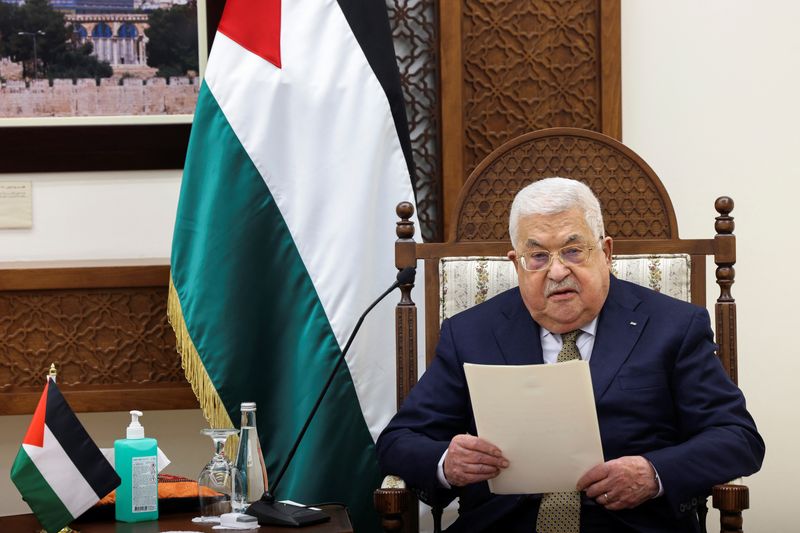JERUSALEM (Reuters) - Mahmoud Abbas spent much of his life before becoming Palestinian president in the shadow of Yasser Arafat, long the figurehead of the Palestinian cause, but he has never secured the same status in the role and has not brought his people closer to statehood.
Based in the West Bank city of Ramallah, the 87-year-old has seen his role further eclipsed by the rise of Hamas, the Islamist group that has controlled Gaza since 2006, and by the expanding Jewish settlements on occupied West Bank land.
U.S. Secretary of State Anthony Blinken visited him on Tuesday, after repeating Washington's support for a two-state solution. But Abbas has previously said Western governments have effectively undermined that goal by failing to recognise Palestine as a state and by failing to hold Israel to account.
It now seems a distant hope with rising bloodshed on the West Bank in the past year, a drive by the new Israeli government to expand West Bank settlements and recurrent exchanges over Gaza of militant rockets and Israeli airstrikes.
"The Israeli government is responsible for what is happening today, because of its practices that undermine the two-state solution and violate the signed agreements," Abbas during Blinken's visit, a charge the Palestinian president often makes and which Israel refutes.
Abbas was the first generation of Palestinian exiles, born after colonial powers drew new Middle Eastern borders and is old enough to recall the first Arab-Israeli war of 1948 when half the 1.4 million Arabs of Palestine - including Abbas himself – fled or were driven from their land into a new life as refugees.
He was an early member of Fatah, the Palestine Liberation Organization (PLO) faction that dominated Palestinian politics for decades. He became leader of both when Arafat died in 2004, and a year later was elected president of the Palestinian Authority, which exercises limited sovereignty in the West Bank.
The high point of his career was a 1993 White House ceremony at which he and Israeli Foreign Minister Shimon Peres signed the Oslo accords which offered the prospect of Palestinian autonomy in the Israeli-occupied West Bank and Gaza Strip.
Behind them were U.S. President Bill Clinton, Arafat and Israeli Prime Minister Yitzhak Rabin, applauding warmly.
In his suit and tie - a stark contrast to Arafat’s keffiyeh headscarf and combat fatigues - Abbas’ advocacy of dialogue over violence and long service as a negotiator raised hopes for a negotiated settlement to the Israeli-Palestinian conflict.
But when Arafat died more than a quarter of a century later the Israeli-Palestinian peace process was moribund and relations with Washington were at a nadir. Critics accused Abbas' inner circle of graft, nepotism and ineffectiveness.
FEWER APPEARANCES
He has been seen less and less in later years, and repeated visits to hospitals have added to concerns about his ability to lead the Palestinian government through political turbulence.
One public appearance in 2018, backfired dismally when - not for the first time - he was accused of anti-Semitism and Holocaust denial in a speech. Amid international condemnation of his remarks, he was forced to apologise.
Abbas was born in 1935 in Safed, a town in what was then British-ruled Palestine and is now northern Israel. He fled to Syria as a child amid fighting over the creation of Israel and later went to work in Qatar, where he joined other Palestinians including Arafat in Fatah.
After Israel captured and occupied the West Bank and Gaza in the 1967 Six Day War, Arafat's Fatah seized control of the PLO and a decades-long guerrilla campaign against Israel began, with its leaders moving from Jordan to Lebanon and later Tunisia.
When the Palestinian leadership returned from exile to Gaza after the Oslo Accords Abbas was upbeat, promising: "I will live in Palestine." But peace talks faltered in following years.
Abbas won a presidential election in 2005 but his Fatah group was defeated 2006 parliamentary elections. Hamas routed Fatah in a civil war in Gaza, leaving Abbas with control of Palestinian-administered areas in the West Bank but there have been no Palestinian elections since.
Seeking to regain the initiative, Abbas made unilateral moves to seek Palestinian statehood at the United Nations. In 2012, Palestine won "non-member statehood" at the U.N. General Assembly. But the goal of a state has remained elusive.

Abbas has held little sway with successive U.S. presidents, whose role is vital in Middle East diplomacy, and he has looked ever more isolated as regional allies the United Arab Emirates, Bahrain and Morocco have signed diplomatic deals with Israel.
"Having contributed to achievements that place our people at the forefront of history," he warned as far back as 1994, "I remain deeply concerned that we could get swept away by history, lose control, and suffer an unrecoverable setback."